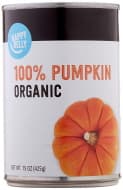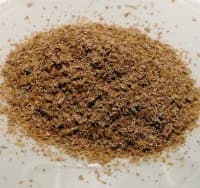Help For A Constipated Dog
If you have a constipated dog, don't panic, it's a fairly common condition and generally doesn't last more than a day or so. But, when it persists, the stools can become hard and dry, making it even more difficult for a dog to pass them.
 Image by Renato Laky
Image by Renato LakyProlonged constipation that lasts 48 hours, or any time there is any indication of pain or the dog is straining, is a cause for concern and a reason to contact the vet right away. When pain is evident, it's possible the pet may have a bowel obstruction and needs expert attention.
Dog Constipation Symptoms
- Constipated dogs will show signs of straining while unsuccessfully trying to pass a stool. (Although this can also be a sign of a dog with diarrhea).
- A dog that has not passed a stool for a 24-28 hours is considered to be constipated. Easy to spot this if you do the scooping!
- Canine constipation is often characterized by a state of low energy and a lack of appetite.
- Constipation in dogs will sometimes be accompanied by vomiting as a symptom.
- Dog constipation may cause an occasional passing of a watery or bloody material.
Typical Reasons A Dog is Constipated
- Dehydration is a fairly common cause for constipation and if so, adding some water to your dog's food is a simple solution - especially if on a dry food regimen.
- Lack of sufficient exercise is sometimes the reason a pet becomes
constipated. Most dogs need at least two walks a day of sufficient duration
for their breed. (See our dog breed page to look up your dog's exercise
needs) Exercise aids in keeping a dog's tummy muscles strong which in turn
helps to keep everything moving along nicely inside the digestive
tract.
Older dogs that can't get as much exercise due to stiff joints or other health issues may need more supplemental treatment. - Another cause of canine constipation is often seen in dogs that have to remain confined for several hours a day while the family members are working. In this situation, the dog may have a need to go outside, but gets into the habit of holding on until someone comes home if they don't have any other means to get out during this time. When you add to this a reduced amount of exercise, the scene is set for a constipated dog.
- Constipation in dogs is often related to diet, so this is another area to review when pets are struggling to defecate. Have you made any abrupt changes to your dog's diet that could be a contributing factor? or given him any new type of treats?
Treatment Options
If your constipated dog is getting sufficient exercise and has plenty of opportunity to get outside when he has an urge to eliminate, then you might want to try one of the following:
 Organic Pumpkin Organic Pumpkin |
 Wheat Bran Wheat Bran |
 Olive Oil Olive Oil |
- Adding a little olive oil to his food for a few days. The amount depends on the size of your dog, but a 1/2 to 1 teaspoon would be a starting point. If the situation normalizes, you can discontinue the oil. If it doesn't help, then consult with your vet.
- Adding more fiber to his food. Depending on the size of your dog, a little bit of bran will help the stools retain more moisture and as a result be easier to pass.
- Another choice is ground flax seed which has the added benefit of improving overall health as well as arthritic joint problems by supplying necessary omega fatty acids. In either case, check with your vet for recommended amounts to give your pet.
Amounts: As a general rule, the approximate amount of bran for pets each day would be in the range of 1/2 teaspoon up to 1 tablespoon of bran a day.
And for the ground flax seed amounts:
Other good choices of fiber to add into your dog's food are lightly
cooked vegetables and canned pumpkin with no additives or sugar.
Any of these remedies need a little time to work, but also don't forget to check with your vet because he knows your dogs complete
health profile and needs.
A Constipated Dog Needs Sufficient Hydration
When your dog is suffering from a bout of constipation it is also very
important that he is drinking sufficient water especially when adding fiber
to his food.
To encourage him to drink enough, make the water more appealing by
refreshing it often. If he is still showing reluctance about taking fluids, you can
try to entice him with some milk.
While milk isn't usually on a dog's diet, it often acts as a laxative and may in the short
term cause him to have loose stools - putting an end to the constipation!
Preventing Constipation In Dogs
- Nothing could be more helpful to a dog's overall health and immune system than a
natural diet containing a proper balance of proteins, fats and carbohydrates.
This will go a long way toward preventing constipation in your pet. So if your dog is not thriving on his present diet, take a look at this dog food page for some better options.
Sadly, many pet illnesses and constipated dog problems are caused by low grade commercial pet foods containing very little in the way of food value, made-up-for by adding worthless fillers and a host of dangerous toxic substances, additives, preservatives, dyes and the like. - Next to diet, exercise is vitally important to all areas of a dog's health. Exercise
keeps the muscles toned, provides cardiovascular benefits, helps the body
to flush out toxins and keeps the digestive system operating smoothly which
in turn leads to easier and more regular evacuation of the bowels.
Older dogs who don't get as much exercise may need more help from dietary fiber, or get relief from acupressure or another holistic approach using crystals to balance internal energy.
- To sum it up, a healthy natural diet combined with sufficient regular exercise, is the best
way to avoid having a constipated dog. Get these two things right and your dog will thank you.
Whenever your dog is experiencing discomfort or a health issue and you are worrying about it, the best thing you can do is have a chat with your vet to put your mind at ease.
Become Informed
To help you be more confident as a dog owner and learn to recognize various dog health conditions, I also suggest you get a copy of Dr. Pitcairn's Complete Guide to Natural Health for Dogs & Cats.
Written by a renowned veterinary authority, this reference contains information about using natural remedies as well as mainstream solutions for dog problems.
- Always consult your veterinarian when you have health-related questions. Information on this website is not intended to replace the advice of a qualified professional.
Read next
